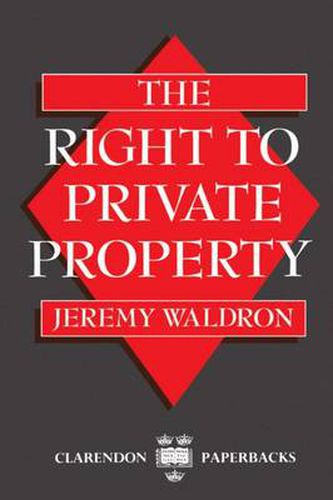Readings Newsletter
Become a Readings Member to make your shopping experience even easier.
Sign in or sign up for free!
You’re not far away from qualifying for FREE standard shipping within Australia
You’ve qualified for FREE standard shipping within Australia
The cart is loading…






Can the right to private property be claimed as one of the “rights of mankind’? This is the central question of this comprehensive and critical examination of the subject of private property. Jeremy Waldron contrasts two types of arguments about rights: those based on historical entitlement, and those based on the importance of property to freedom. He provides a detailed discussion of the theories of property found in Locke’s Second Treatise and Hegel’s Philosophy of Right to illustrate this contrast. The book contains original analyses of the concept of ownership, the ideas of rights, and the relation between property and equality. The author’s overriding determination throughout is to follow through the arguments and values used to justify private ownership. He finds that the traditional arguments about property yield some surprisingly radical conclusions.
$9.00 standard shipping within Australia
FREE standard shipping within Australia for orders over $100.00
Express & International shipping calculated at checkout
Can the right to private property be claimed as one of the “rights of mankind’? This is the central question of this comprehensive and critical examination of the subject of private property. Jeremy Waldron contrasts two types of arguments about rights: those based on historical entitlement, and those based on the importance of property to freedom. He provides a detailed discussion of the theories of property found in Locke’s Second Treatise and Hegel’s Philosophy of Right to illustrate this contrast. The book contains original analyses of the concept of ownership, the ideas of rights, and the relation between property and equality. The author’s overriding determination throughout is to follow through the arguments and values used to justify private ownership. He finds that the traditional arguments about property yield some surprisingly radical conclusions.